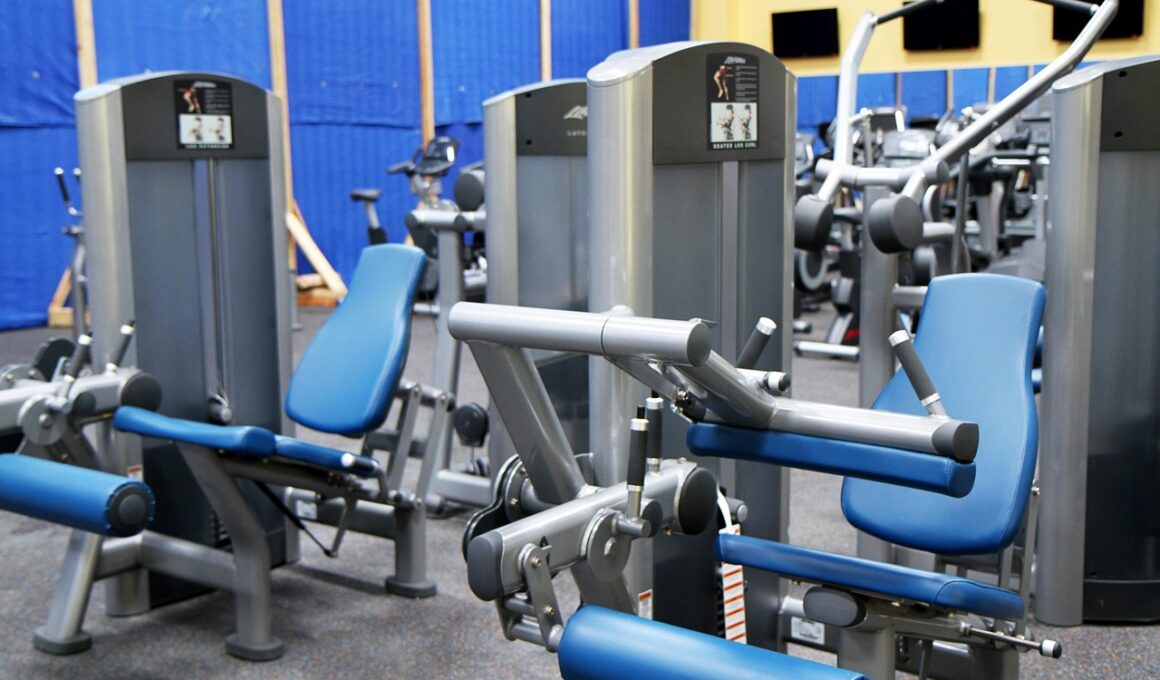Combating Plateaus in Cardiovascular Fitness and Weight Loss
Plateaus often become a frustrating obstacle in the journey of cardiovascular fitness and weight loss. This phenomenon occurs when the body adapts to repetitive workouts, leading to diminished results over time. A plateau doesn’t necessarily signal failure. Instead, it highlights the body’s ability to become more efficient at processing workouts. The good news is that overcoming these stagnations typically involves minor adjustments in routines. Firstly, SPICE UP your routine by incorporating different forms of cardio such as cycling, swimming, or HIIT. These changes stimulate different muscle groups, effectively breaking the plateau cycle. Additionally, consider increasing your workout duration, which can enhance overall calorie burn significantly. Another effective technique is to vary the intensity levels during workouts; try interval training for example. This method alternates between high and low-intensity bursts, providing an excellent cardiovascular challenge. Remember that nutrition plays a crucial role in fitness. Adjusting your diet to include nutrient-dense foods and managing caloric intake can positively contribute to overcoming plateaus. Staying hydrated is equally important, as water keeps metabolism in check. Bottom line, combating plateaus requires knowledge, creativity, and discipline.
One often overlooked aspect of breaking through plateaus is the importance of rest and recovery. During periods of intense exercise, the body needs time to repair and grow stronger. If you are constantly pushing your limits without allowing recovery, you risk injury and can contribute to further plateaus. Incorporate rest days into your weekly routine, focusing on active recovery techniques like yoga or light walking. These strategies keep the body engaged while facilitating recovery. Also, consider periodic withdrawal from your typical fitness routines. A temporary reduction in workout intensity or duration can help reset your body’s adaptation. The psychological aspect cannot be overlooked either; boredom can lead to a plateau; thus, maintaining a motivational environment can be vital. Make your workouts enjoyable. Joining a group class or workout with a friend can infuse energy and enthusiasm into your routines. Keeping a workout journal may also help track progress and encourage goal-setting. Create specific, measurable goals to keep pushing forward. Lastly, celebrate your achievements, no matter how small they may be, to maintain motivation and an optimistic mindset.
Nutrition Adjustments for Overcoming Plateaus
Nutrition plays an indispensable role in fitness and is just as crucial as exercise. When dealing with fitness plateaus, consider reevaluating your caloric intake and macronutrient ratios. Often, individuals unknowingly decrease their overall active caloric expenditure as they adapt to exercise routines. Assess your daily caloric needs and calculate with precision to ensure you are in a caloric deficit if weight loss is your aim. Increasing protein intake can also be essential for those aiming to lose weight while preserving muscle mass. Protein-rich foods increase satiety, helping to manage hunger effectively. Additionally, pay attention to your carbohydrate intake; some individuals may find that large portions can stall progress. Opt for complex carbohydrates, as they provide sustained energy and are preferable to simple sugars. Replace processed foods with whole grains, fruits, and vegetables. Furthermore, staying adequately hydrated is crucial because dehydration can slow metabolism and hinder performance. If weight loss stalls, consider implementing intermittent fasting or cycling your caloric intake. Such variations can provide the necessary shock to the system, effectively overcoming plateaus in weight loss.
Incorporating cross-training into your workout regime can greatly assist in overcoming plateaus in cardiovascular fitness. Cross-training allows you to engage in different physical activities, promoting overall fitness and reducing overuse injuries. By integrating diverse forms of cardio, such as rowing, dancing, or hiking, you keep workouts fresh and exciting. Moreover, cross-training often enables a balanced workout routine by improving strength, endurance, and flexibility simultaneously. This customized approach can lead to enhanced performance, which may help break through those stubborn plateaus. Additionally, consider implementing strength training into your routine; building muscle increases your metabolic rate at rest and can lead to improved cardiovascular performance. Novice exercisers may benefit significantly from working with a trainer who can customize regimens tailored to specific goals. Invest in quality workout gear that enhances performance, making exercise more enjoyable and effective. Finally, foster a supportive community around you. Engage in discussions with other fitness-lovers and share tips and challenges. Networking often results in motivation and new insights, giving you fresh ideas to combat those plateaus effectively.
Keeping a Positive Mindset
A positive mindset is crucial for long-term success in cardiovascular fitness and weight loss. Struggling with plateaus can lead to feelings of discouragement and frustration, potentially causing you to abandon your goals. Instead of viewing these plateaus as failures, try to see them as opportunities for growth and learning. Maintaining optimism during difficult times fosters resilience. Daily affirmations or visualization techniques can help you stay motivated and focused on your goals. Surrounding yourself with positivity, like supportive friends and family or motivational materials, can further bolster your mental strength. Setting short-term, achievable goals can provide a sense of accomplishment as well. Rather than fixating solely on the end goal, celebrate minor victories along the way. These small successes encourage continued effort and commitment. Additionally, allow yourself time to adjust to new changes; adaptations in workout routines or nutritional plans typically take time to manifest as visible results. Maintaining a journal to document thoughts, feelings, and experiences during your fitness journey can also enhance self-awareness. You can look back on this progress, reinforcing determination as you realize how far you’ve come despite any plateaus.
Ultimately, seeking professional guidance can be a valuable approach if plateaus persist despite efforts to combat them. Consider consulting with a registered dietitian or a certified personal trainer, as these professionals can provide tailored advice specific to your unique situation. A personalized program takes into account your lifestyle, preferences, and fitness level, maximizing effectiveness. Online resources and forums can also be invaluable, offering a wealth of knowledge from fellow fitness enthusiasts. Moreover, engaging in platforms that promote healthy discussions can contribute to the motivation necessary to stay committed to goals. Remember that experiencing a plateau is entirely natural, especially as you push your physical limits. What matters most is how you respond to it. Adapting your approach, examining your habits, and staying persistent will ultimately lead to success. Encourage others by sharing your experiences and strategies, creating a network of support, overly emphasizing the communal aspect of fitness. Encourage open dialogues about struggles and achievements, which can profoundly impact your motivation. In closing, embrace the journey, remain adaptable, and stay resilient, as these traits will empower you in your pursuit of cardiovascular fitness and weight loss.
The Importance of Routine Variations
One crucial strategy in battling plateaus is to maintain an adaptable routine. Changing your workout schedule every 4-6 weeks can prevent the stagnation that often leads to fitness plateaus. By introducing variations in intensity, duration, and type of exercise, you’ll keep your body guessing and engaged. Moreover, allowing enough time for recovery is critical. Athletes often overlook this aspect, thinking more is always better. Instead of relentless drilling, consider implementing a deload week or periods of reduced effort. Research suggests that these changes can significantly boost performance and enhance progress. Engaging in selective fatigue through targeted muscle exhaustion can ensure continued improvements, separating you from the competition. Pay attention to how your body responds to changes; tracking personal metrics like heart rate, recovery time, and overall mood can guide adjustments in your routine. Importantly, challenges in progress must be met with a positive embrace instead of frustration. Consider using a wide variety of motivation and support systems to maintain consistency. Joining fitness communities can inspire accountability and encouragement. Ultimately, cultivating a flexible and adaptive approach, while keeping a keen eye on body feedback, is essential for overcoming plateaus.
Value patience during your fitness journey; results are often gradual and may ebb and flow. Acknowledge the struggles that come with plateaus as signs of your commitment to improvement. Reflect on your previous achievements, as they serve as reminders of resilience and progress. Stick to your long-term vision, as reaching your desired fitness state is not a sprint but a marathon. Periodically revisit your initial motivations and goals. Understanding why you began your fitness journey can reignite determination and clarity. Aim to establish a solid connection to your aspirations and values; this creates a stronger commitment to your plan. Introduce mindfulness practices like meditation or deep breathing during this journey. Mindfulness enhances focus and ability to manage stress, which aids in overall mental well-being. Make your fitness plan enjoyable; if activities feel like a chore, you’re less likely to stick with them. Choose classes or workouts you genuinely look forward to, transforming the routine into a source of joy rather than obligation. In conclusion, patience prevails; remain consistent while elevating your mindset. These attributes will guide you to triumph in your pursuit of improved cardiovascular fitness and notable weight loss.


